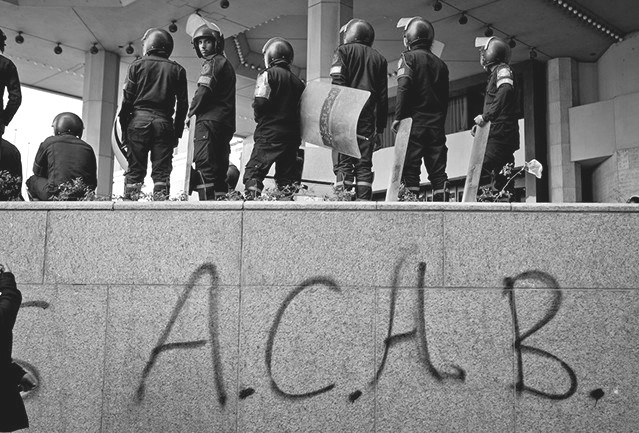Invisible Committee - To Our Friends
Here you can read online Invisible Committee - To Our Friends full text of the book (entire story) in english for free. Download pdf and epub, get meaning, cover and reviews about this ebook. year: 2015, publisher: Semiotext(e), genre: Religion. Description of the work, (preface) as well as reviews are available. Best literature library LitArk.com created for fans of good reading and offers a wide selection of genres:
Romance novel
Science fiction
Adventure
Detective
Science
History
Home and family
Prose
Art
Politics
Computer
Non-fiction
Religion
Business
Children
Humor
Choose a favorite category and find really read worthwhile books. Enjoy immersion in the world of imagination, feel the emotions of the characters or learn something new for yourself, make an fascinating discovery.

- Book:To Our Friends
- Author:
- Publisher:Semiotext(e)
- Genre:
- Year:2015
- Rating:3 / 5
- Favourites:Add to favourites
- Your mark:
- 60
- 1
- 2
- 3
- 4
- 5
To Our Friends: summary, description and annotation
We offer to read an annotation, description, summary or preface (depends on what the author of the book "To Our Friends" wrote himself). If you haven't found the necessary information about the book — write in the comments, we will try to find it.
To Our Friends — read online for free the complete book (whole text) full work
Below is the text of the book, divided by pages. System saving the place of the last page read, allows you to conveniently read the book "To Our Friends" online for free, without having to search again every time where you left off. Put a bookmark, and you can go to the page where you finished reading at any time.
Font size:
Interval:
Bookmark:
Invisible Committee
Originally published as nos amis in 2014
Translated from the French by Robert Hurley
Digitized from the first Semiotext(e) printing
To those for whom the end of a civilization is notthe end of the world;
To those who see insurrection first of all as a breach in the organized reign of stupidity, lies,and confusion;
To those who discern, behind the thick fog ofcrisis, a theater of operations, maneuvers,strategemsand hence the possibility of a counterattack;
To those who strike blows;
To those watching for the right moment;
To those looking for accomplices;
To those who are deserting;
To those who keep going;
To those getting organized;
To those wanting to build a revolutionary force,revolutionary because its sensitive;
This modest contribution to an understanding ofour time.
To Billy, Guccio, Alexis, and
Jeremy Hammond then,
There is no other world.
Theres just another way to live.
Jacques Mesrine

The insurrections have come, finally. At such apace and in so many countries, since 2008, thatthe whole structure of this world seems to bedisintegrating, piece by piece. Ten years ago,predicting an uprising would have exposed you to thesnickers of the seated ones; now its those whoannounce a return to order who make themselveslook foolish. Nothing more solid, moreself-assured, we were told, than the Tunisia of Ben Ali,the busy Turkey of Erdogan, social-democraticSweden, Baathist Syria, Quebec on tranquilizers,or the Brazil of beaches, the Bolsa Familia, andpeace-keeping police units. Weve seen whatfollowed. Stability is finished. In politics, too, theyvelearned to think twice before awarding a triple A.
An insurrection can erupt at any time, for anyreason, and lead anywhere. The ruling politicianswalk among the abysses. Their own shadowsappear to threaten them. Que se vayan todos! was aslogan; its become a common conviction, the bassocontinuo of the epoch, a rumble passing from voiceto voice, then lifting up like an ax when its leastexpected. The cleverest of the politicians have madeit into a campaign promise. They dont have anychoice. Incurable disgust, pure negativity, andabsolute refusal are the only discernable politicalforces of the moment.
The insurrections have come, but not therevolution. Rarely has one seen, as we have these pastfew years, in such a densely-packed timespan, somany seats of power taken by storm, from Greeceto Iceland. Occupying plazas in the very heart ofcities, pitching tents there, erecting barricades,kitchens, or makeshift shelters, and holdingassemblies will soon be part of the political reflex, likethe strike used to be. It seems that the epoch haseven begun to secrete its own platitudes, like thatAll Cops Are Bastards (ACAB) which a strangeinternationale emblazons on the rough walls ofcities, from Cairo to Istanbul, and Rome to Parisor Rio, with every thrust of revolt.
But however great the disorders in this worldmay be, the revolution always seems to choke off atthe riot stage. At best, a regime change satisfies foran instant the need to change the world, only torenew the same dissatisfaction. At worst, revolutionserves as a stepping stone for those who speak in itsname but only think of liquidating it. In places,France for example, the nonexistence ofrevolutionary forces with enough confidence in themselvesclears the way for those whose profession is preciselyto feign self-confidence, and offer it up as aspectacle: the fascists. Helplessness is embittering.
At this point it must be admitted that werevolutionaries have been defeated. Not because since2008 we havent achieved revolution as an objective,but because, under a steady barrage ofobscurantism, weve lost sight of of revolution as a process.When we fail, we can blame the whole world,making up all sorts of explanations, even scientificones, based on a thousand resentments, or we canquestion ourselves about the toeholds which theenemy may have within us that determine thenon-accidental, repeated character of our failures.We might inquire, for example, as to what remainsof leftism among revolutionaries and whether itdisposes them not only to defeat but also to a nearlygeneral hostility. A certain way of asserting a moralsuperiority which they havent earned is doubtlessa quirk inherited from the left. As is the presumedability to decree the right way to livethe way thatis truly progressive, enlightened, modern, correct,deconstructed, and undefiled. A claim to whichanyone coming under its summary banishment among thereactionaries-conservatives-obscurantists-narrowminds-bumpkins-fogieswill respond withthoughts of murder. Far from creating a distance,the heated rivalry of revolutionaries with the leftonly keeps us moored to its ground. We shouldcast off!
Since The Coming Insurrection, weve gone to theplaces where the epoch was inflamed. Weve read,weve fought, weve discussed with comrades ofevery country and every tendency. Together withthem, weve come up against the invisible obstaclesof the times. Some of us have died, others have seenprison. Weve kept going. We havent given up onconstructing worlds or attacking this one. Wevereturned from our stays abroad with the certaintythat we werent living through erratic, separaterevolts that were isolated from each other andwould still need to be connected. This is whatnews-reporting constructs and dramatizes in itscalculated management of perceptions, being thework of counter-insurrection, which begins at thatminute scale. We are not contemporaneous withscattered revolts, but with an unparalleled globalwave of uprisings that intercommunicateimperceptibly. Moved by a universal desire to be together thatonly a universal separation can explain. By a generalhatred of the police that expresses a lucid refusal ofthe general atomization which the police oversees.The same anxiety is visible everywhere, the samedeep panic, provoking the same upwellings ofdignity, and not indignation. What is happening inthe world since 2008 isnt an incoherent series ofcrazy outbursts occurring suddenly in hermeticallysealed countries. Its a single historical sequenceunfolding in a strict unity of place and time,from Greece to Chile. And only a distinctly globalperspective can capture its significance. We cantleave it to the think tanks of capital to spell out thepractical implications of this sequence.
However localized it may be, every insurrectiongestures beyond itself; it contains somethingglobal from the outset. It raises us together to thelevel of the epoch. But the epoch is also what wefind deep within us, that is, when were willing todescend that far, when we immerse ourselves inwhat were experiencing, seeing, feeling, perceiving.Theres a way of knowledge in this, and a code ofaction; theres also what explains the undergroundconnection between the pure intensity of streetcombat and the unalloyed self-presence of theloner. The epoch must be sought deep withineach situation and deep within each person. Thatis where we meet up, where real friends arefound, scattered over the globe, but walking theroad together.
The conspiracy theorists are counterrevolutionaryin one respect at least; they reserve the privilege ofconspiracy exclusively for the power elite. Whileits obvious that those in power scheme to preserveand extend their positions, its no less certain thattheres conspiracy everywherein building hallways,at the coffee machine, in the back of kebab houses,at parties, in love affairs, in prisons. Throughcapillary channels and on a global scale, all theseconnections, all these conversations, all thesefriendships are forming a historical party inoperationour party, as Marx said. Confronting theobjective conspiracy of the order of things, there isa diffuse conspiracy of which we are de factomembers. But the greatest confusion obtains within it.Everywhere it turns, our party stumbles over itsown ideological inheritance. It gets caught up in awhole tangle of defeated and defunct revolutionarytraditions, which demand respect nonetheless. Butstrategic intelligence comes from the heart and notthe brain, and the problem with ideology isprecisely that it forms a screen between thinking andthe heart. To put this differently: were obliged toforce open a door to a space we already occupy.The only party to be built is the one thats alreadythere. We must rid ourselves of all the mentalclutter that gets in the way of a clear grasp of ourshared situation, our common terrestritude, touse Gramscis expression. Our inheritance is notpreceded by any will or testament.
Next pageFont size:
Interval:
Bookmark:
Similar books «To Our Friends»
Look at similar books to To Our Friends. We have selected literature similar in name and meaning in the hope of providing readers with more options to find new, interesting, not yet read works.
Discussion, reviews of the book To Our Friends and just readers' own opinions. Leave your comments, write what you think about the work, its meaning or the main characters. Specify what exactly you liked and what you didn't like, and why you think so.









